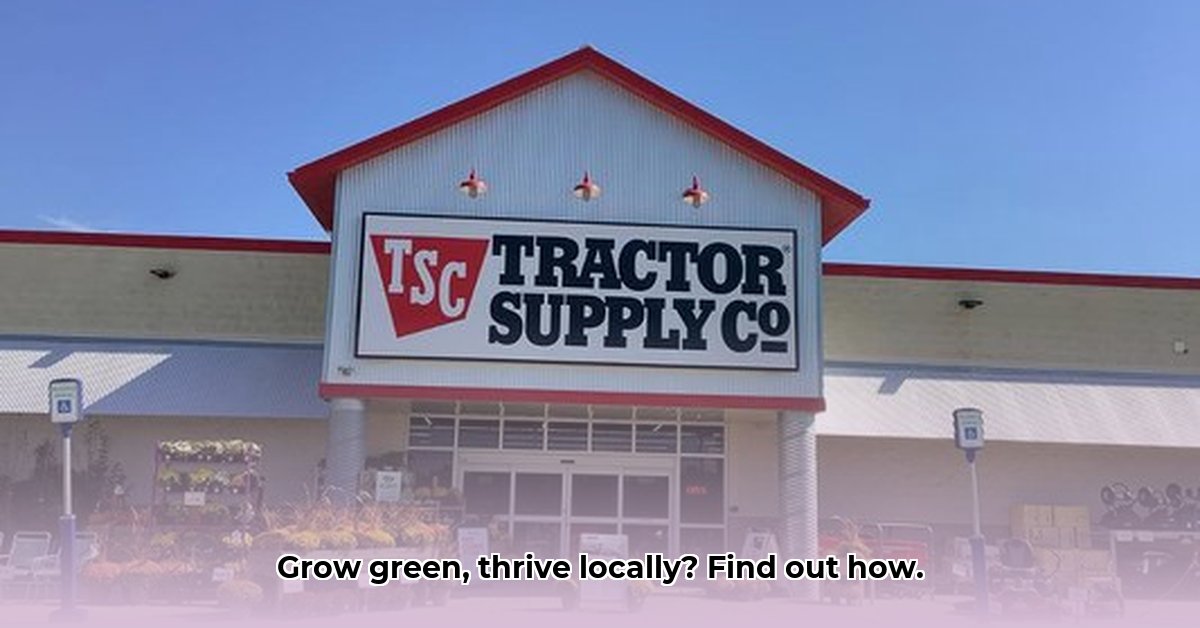
Cultivating a Greener Future for Dinuba's Agriculture
Dinuba, California, a town deeply rooted in its agricultural heritage, faces the challenge of balancing thriving farmland with environmental sustainability. Dinuba Tractor Supply, a cornerstone of the community, holds a unique position to foster this balance. This article explores how the store can leverage its resources and influence to promote sustainable agriculture practices, benefiting both the environment and the local economy. We'll examine current realities, identify opportunities for improvement, and propose actionable steps for a greener future. For more information on pet-friendly policies, check out our pet policy page.
Understanding the Current Landscape
Dinuba Tractor Supply currently serves a diverse clientele, providing essential supplies for farmers of all scales, from seasoned professionals to enthusiastic backyard gardeners. However, a comprehensive assessment of its current contribution to sustainable agriculture is lacking. Key data points on the sourcing of its products, waste management practices, and energy consumption remain unavailable. This knowledge gap hinders a complete understanding of the store's current environmental footprint and its potential for positive change. A crucial first step is to gather this data and establish a baseline for future progress. How can we accurately measure progress without a clear understanding of our starting point?
Planting the Seeds of Change: Actionable Steps for Sustainability
The potential for Dinuba Tractor Supply to lead the charge toward sustainable agriculture is significant. The following short-term and long-term strategies offer a roadmap for achieving this goal.
Short-Term Goals (Within the next year):
Farmer Focus Groups: Conduct comprehensive surveys and focus groups with local farmers to directly assess their needs and preferences concerning sustainable agricultural products and resources. This direct feedback will inform product selection and ensure the store actively addresses farmer requirements.
Transparency Initiative: Develop a transparent system detailing the sourcing of products, waste management protocols, and energy usage within the store. Publicly sharing this information fosters trust and demonstrates a commitment to environmental responsibility.
In-Store Education: Implement clear signage and educational displays prominently highlighting sustainable product options. This in-store education initiative empowers consumers to make informed, eco-conscious choices.
Long-Term Goals (Within the next three years):
Partnership with Local Experts: Collaborate with local agricultural organizations, universities, and extension services to host workshops and training sessions on sustainable farming practices. This shared expertise strengthens community engagement and knowledge dissemination.
Measurable Sustainability Goals: Set specific, measurable, achievable, relevant, and time-bound (SMART) goals for reducing the store's environmental impact and increasing the sales of eco-friendly products. This data-driven approach provides clear benchmarks for assessing progress.
Government and Community Collaboration: Explore opportunities to partner with local government on sustainability initiatives, seeking grant funding and access to resources that support sustainable food systems and land management practices.
Addressing Challenges: Building Resilience
Several challenges might hinder progress toward a more sustainable operation:
- Limited Availability of Sustainable Products: Actively seek out and partner with suppliers specializing in eco-friendly alternatives.
- Low Consumer Awareness: Launch targeted educational campaigns, workshops, and demonstrations to raise consumer awareness about sustainable options and their benefits.
- Data Collection Difficulties: Implement a comprehensive data management system to track and analyze relevant sustainability metrics.
- Competition: Highlight the store's commitment to sustainability as a unique selling proposition, differentiating it from competitors.
Water Conservation: A Vital Resource
Dinuba's agricultural success hinges on responsible water management. Dinuba Tractor Supply can play a vital role by promoting water-efficient irrigation technologies, such as drip irrigation and micro-sprinklers. Furthermore, offering workshops and educational materials on efficient irrigation practices empowers farmers to conserve this precious resource. The cumulative effect of reduced water consumption across multiple farms can significantly benefit the region's water security.
Promoting Sustainable Products: Empowering Eco-Conscious Choices
Stocking and promoting organic fertilizers, biopesticides, and sustainably packaged products empowers farmers to adopt more environmentally friendly practices. Making these choices readily available demonstrates a commitment that resonates with the community.
Community Engagement: A Collaborative Ecosystem
Partnerships with local farmers, agricultural organizations, and community leaders are vital. Joint workshops, farmer testimonials, and educational events create a network of shared knowledge and mutual support, strengthening the collective impact of sustainability efforts.
Regulatory Compliance: A Cornerstone of Ethical Practice
Adhering to all relevant environmental regulations is paramount. Responsible pesticide use, water conservation measures, and proper waste disposal are essential components of a sustainable approach that builds public trust.
Conclusion: A Shared Vision for a Thriving Future
Dinuba Tractor Supply has a significant opportunity to become a catalyst for sustainable agriculture in Dinuba. By embracing the strategies outlined above, the store can contribute to a greener, more prosperous future for the community, while reinforcing its position as a vital part of Dinuba's agricultural landscape. The collaborative effort between the store, local farmers, and the community will yield a shared success story.